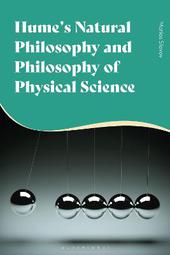
|
Hume's Natural Philosophy and Philosophy of Physical Science
Paperback / softback
Main Details
| Title |
Hume's Natural Philosophy and Philosophy of Physical Science
|
| Authors and Contributors |
By (author) Dr Matias Slavov
|
| Physical Properties |
| Format:Paperback / softback | | Pages:216 | | Dimensions(mm): Height 234,Width 156 |
|
| Category/Genre | Western philosophy from c 1900 to now |
|---|
| ISBN/Barcode |
9781350185036
|
| Classifications | Dewey:192 |
|---|
| Audience | | Tertiary Education (US: College) | |
|---|
|
Publishing Details |
| Publisher |
Bloomsbury Publishing PLC
|
| Imprint |
Bloomsbury Academic
|
| Publication Date |
21 April 2022 |
| Publication Country |
United Kingdom
|
Description
This book contextualizes David Hume's philosophy of physical science, exploring both Hume's background in the history of early modern natural philosophy and its subsequent impact on the scientific tradition. Drawing on Cartesian cosmology and Einstein's special relativity, and taking in topics including experimentalism, causation, laws of nature, metaphysics of forces, mathematics' relation to nature, and the concepts of space and time, this book deepens our understanding of Hume's relation to natural philosophy. It does so in addition by situating Hume's thought within the context of other major philosophers and scientists, including Descartes, Locke, Boyle, Kant, Newton, and Leibniz. Demonstrating above all Hume's understanding of the fluid relationship between philosophy and science, Hume's Natural Philosophy and Philosophy of Physical Science will provide new insights for historians and philosophers of science.
Author Biography
Matias Slavov is Postdoctoral Researcher at Tampere University, Finland
ReviewsSlavov's highly engaging and valuable book puts pressure on the still-dominant depiction of David Hume as a proto-cognitive psychologist. Slavov turns our attention back to Hume the philosopher. But this is not the Hume whose radical empiricist philosophy collapses under its own skeptical weight. Slavov impressively reveals to us a philosophical system that is not only inextricably linked with the history of natural philosophy, but also, and more fundamentally, is intellectually engaged with the natural philosophy and physical science of its time. * Miren Boehm, Associate Professor of Philosophy, University of Wisconsin-Milwaukee, USA *
|